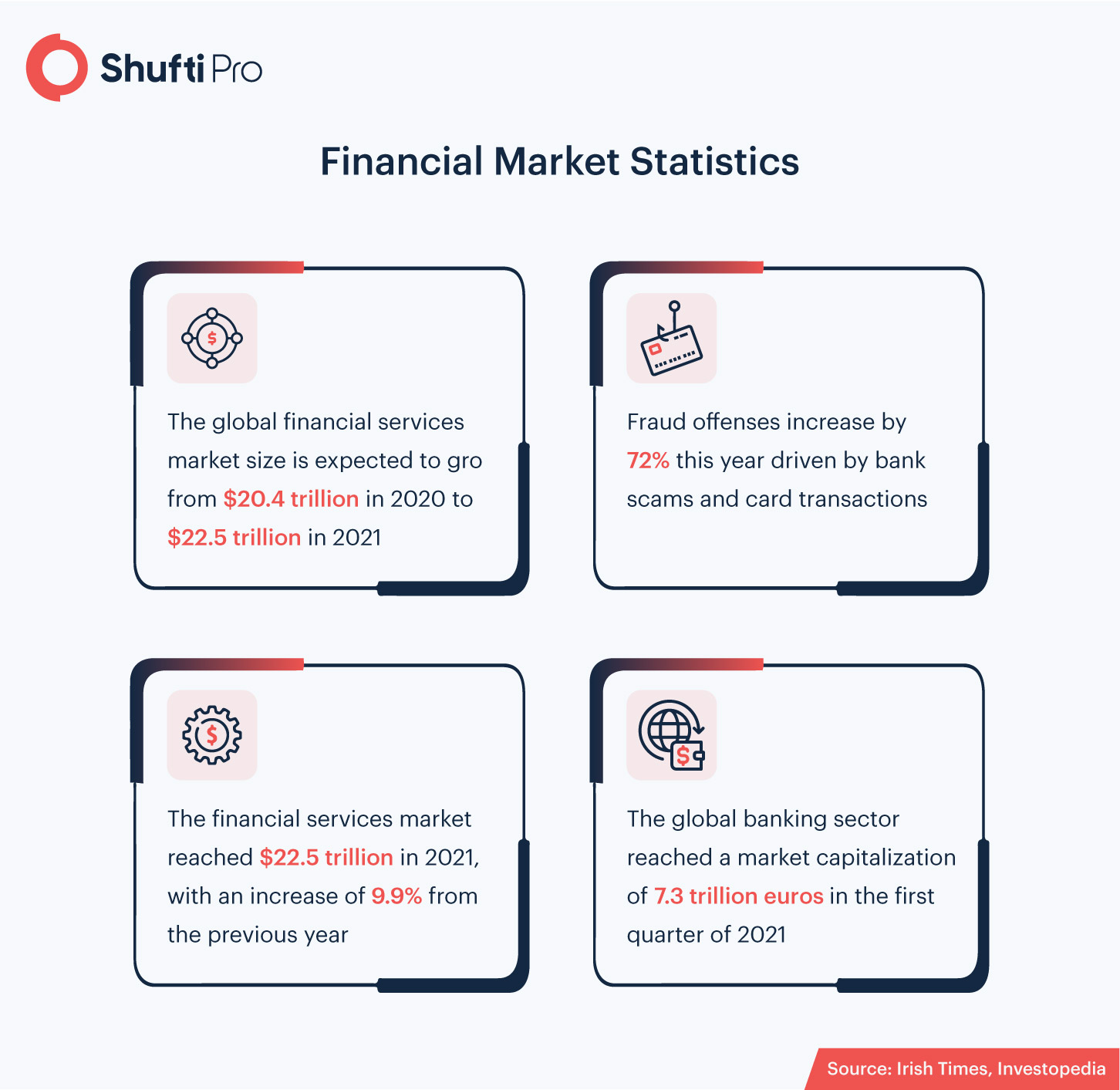Global Expansion, Digitization, and Crimes – How Shufti Can Help Financial Industry

The financial industry has seen significant technological changes over the past recent years. Many businesses have re-designed their IT departments to enhance efficiency and embrace game-changing innovations, while somehow these changes lowered the cost of maintenance and continued to back legacy systems. Moreover, FinTech companies are trespassing established financial markets, providing seamless and customer-friendly solutions to overcome real-life problems for instance verifying the identities of digital customers.
On another hand, the customers have had some expectations from the financial industry, as they are in dire need of robust services, frictionless service regardless of medium, and more value for their money. However, with the advent of digital services, a number of crimes including money laundering and terrorist financing are on rising. Therefore, the financial industry has become subject to ever-evolving AML/KYC regulations. Hence, financial watchdogs expect more from this sector and have started to adopt emerging technologies that can enhance the ability of data collection and processing, whereas, the pace of changing landscape shows no sign of slowing down.
Sharing Economy – A Way of Expanding Financial Services
After the spread of covid began to slow down, customers are in need of financial services that can be virtually availed without visiting the bank, or, maybe not what clients think of as a bank today. Sharing economy that was initially started with hotel rooms, cars, and taxis is now expanding to financial services as well. However, the concept of sharing economy in the financial industry refers to decentralized assets ownership and utilizing the information technology to either find matches or verify customers, rather than turning them back to the bank as an intermediary.
Today, people then think of financial firms as the legal entity that initiates and manages end-to-end transitions, while putting funds at risk. However, as global digitization is disrupting the financial industry, a business may play the role of intermediary with small stakes or just be one node in the global financial ecosystem. This is quite possible with the evolution of P2P transactions that are carried out with third-party partners and a new breed of FinTech companies. Other than this, these companies are also designing and developing products as well as services to improve value chains and specific requirements of clients as clients are also getting smarter about options.
Moreover, many companies are also specifically targeting student debt, connecting debtors and investors. They are creating digital platforms that can allow individuals to raise funds and withdraw credit from retail investors. For example, Apple has filed a patent application that will enable customers to avail peer-to-peer services using electronic devices. This will further expand retail banking even further while making the operations robust, secure, and seamless.
However, in developing markets, where the branch networks of financial firms are less, particularly in rural areas, physical distribution will continue to and banks need to partner with third parties or create alternative distribution channels. For example in Kenya, Vodafone handles deposits and payments through smartphones and a dense network of agents. Thus, financial firms need to consider the sharing economy opportunity including digital intermediaries and partnerships that also might assist them to deliver robust and low-cost services. In addition to this, due to informal profiles, startups may seem like a threat but in this digital world, when companies and individuals are becoming tech-savvy, new emerging clients will be in search of lower fees, easy to use, and convenient service. Thus, once there is enough liquidity and crucial mass, the financial market can grow exponentially.

Rigid Regulation To Secure Digital Financial Ecosystem
Both businesses and individuals are directly or indirectly dependent on the financial system. For instance, individuals rely on banks to hold their wealth or use their platform to transfer funds. Businesses need to take loans to maintain their standard and support operations. However, this is only the beginning. Financial institutions are continuously automating their KYC/AML control systems, trade surveillance, and other areas. Whereas, regulatory authorities will seek direct access to these tools or through third-party vendors, either ongoing basis or during supervisory reviews. As a result, the financial services and operations will become more transparent. This will allow users to find the firms trustworthy as they can better understand where their data is being used or kept. Thus, keeping in view the current condition of the financial industry, regulatory bodies are developing a more rigid set of regulations to assist the market and help them to expand globally.
However, financial firms that are not heavily regulated have the potential to undermine the stability of the financial systems, putting customers’ wealth and information at stake, along with damaging their own reputation. Thus, financial regulation holds great significance, and institutions need to stay put under regulatory obligations.
Let’s discuss some of the financial regulations;
Proceeds of Crime Act
Proceeds of Crime Act 2002, is the UK’s primary anti-money laundering regulation that defines the set of financial offenses particularly money laundering. Those activities cover the facilitation and perpetration of money laundering as well as distribution of its criminal proceedings. Under this Act, all the financial firms including the banks need to have rigid AML controls in place that can detect money laundering activities; these include customer due diligence, enhanced due diligence, transaction monitoring, and suspicious activity reporting.
The Terrorism Act
While the Proceed of Crime Act only focuses on money laundering activities, the Terrorism Act imposes countering the financing of terrorist regulation on banks and financial firms, which include transaction monitoring, enhanced due diligence, and reporting obligations. However, this Act was first introduced in 2000 but was amended by the Anti-Terrorism, Crime and Security Act 2001, the Terrorism Act 2006, and the Terrorism Act 2000, as well as Proceeds of Crime Act 2002.
Sixth Anti-Money Laundering Directive
The EU 6AMLD came into effect in June 2021, which was a major amendment in the 5AMLD that was legislated to strengthen the existing AML and CFT regulations, the 6AMLD aims to empower financial firms to effectively fight the rising number of financial crimes. Under this directive, all financial institutions are obliged to develop in-house anti-money laundering controls, including new predicate offenses that must be monitored along with the new risk assessment standards. In addition to this, banks also need to hire an AML compliance officer and also train their staff to determine any kind of suspicious activities seamlessly. Other than this, transaction monitoring and background screening are also made mandatory to identify the true identities of customers before they get on board.
How shufti Pro Can Help
Shufti’s state-of-the-art anti-money laundering and identity verification solutions are viable options for the financial industry as it allows them to identify the true identities of the customers along with performing client background screening and ongoing monitoring. Powered with thousands of AI algorithms, it can screen customers against 1700+ global watchlists to develop customer risk profiles. Shufti’s automated KYC/AML service holds significance as It can help to stay put with the regulatory obligations, save from fines and eliminate the potential risk of financial crimes.
Get in touch with the experts to know more about AML for the Financial Industry?

 Explore Now
Explore Now













